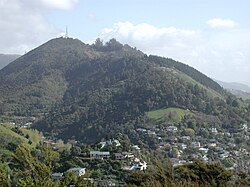Bishopdale, Nelson
Bishopdale | |
|---|---|
Suburb | |
 | |
 | |
| Coordinates: 41°17′50″S 173°16′0″E / 41.29722°S 173.26667°E | |
| Country | New Zealand |
| Region | Nelson |
| Territorial authority | Nelson |
| Government | |
| • Nelson City Mayor | Nick Smith |
| • Nelson MP | Rachel Boyack |
| • Te Tai Tonga MP | Tākuta Ferris |
| Area | |
| • Total | 2.95 km2 (1.14 sq mi) |
| • Land | 2.95 km2 (1.14 sq mi) |
| • Water | 0 km2 (0 sq mi) |
| Population (June 2024) | |
| • Total | [1] |
| Time zone | UTC+12 (NZST) |
| • Summer (DST) | UTC+13 (NZDT) |
| Postcode | 7010 |
| Area code | 03 |
Bishopdale is one of the suburbs of Nelson, New Zealand.
It lies to the south of Nelson city centre, inland from Wakatu, at the foot of the Grampians Reserve.[2]
Geography
[edit]The Grampians statistical area, which corresponds with the Bishopdale suburb, covers an area of 2.95 km².[3]
The suburb has several public reserves: Bishopdale Reserve, Bishopdale Retention Dam Bank, Cattle Market Reserve, Station Reserve and Waimea South Reserve.[4]
History
[edit]The estimated population of the area reached 1,910 in 1996.[5]
It reached 2,000 in 2001, 2,010 in 2006, 2,120 in 2013, and 2,210 in 2018.[5]
Demography
[edit]The area has an estimated population of 2,730. It has a population density of 850.08 people per km² as of 2019.[6]
As of the 2018 census, the median age was 43.6, the median income was $26,300, 3.4% of people earned over $100,00, 20.6% had a Bachelor's Degree or higher, and 4.8% of the workforce was unemployed.[5]
Ethnically, the population was 78.2% New Zealand European, 15.8% Māori, 3.7% Pacific peoples, 11.8% Asian, 1.0% Middle Eastern, Latin American, or African, and 1.1% identified with other ethnicities; 24.1% were born overseas.[5]
Religiously, the population is 56.5% non-religious, 30.8% Christian, and 1.6% Buddhist.[5]
Economy
[edit]In 2018, 9.8% worked in manufacturing, 8.3% worked in construction, 6.8% worked in hospitality, 6.1% worked in transport, 6.8% worked in education, and 14.4% worked in healthcare.[5]
Transport
[edit]As of 2018, among those who commuted to work, 32.6% drove a car, 2.2% rode in a car, 3.6% use a bike, and 3.6% walk or run.[5]
No one used public transport.[5]
References
[edit]- ^ "Aotearoa Data Explorer". Statistics New Zealand. Retrieved 26 October 2024.
- ^ Wise's Nelson-Blenheim "Easyread" Map ISBN 1 877402 50 8
- ^ "Statistical Area 2 2018 (generalised) GIS" (Data table). stats.govt.nz. Statistics New Zealand.
- ^ "Nelson Parks and Reserves". gdc.govt.nz. Gisborne District Council.
- ^ a b c d e f g h "Place Summary – Grampians". Stats NZ. Statistics New Zealand.
- ^ "Provisional Statistics". stats.govt.nz. Statistics New Zealand.
